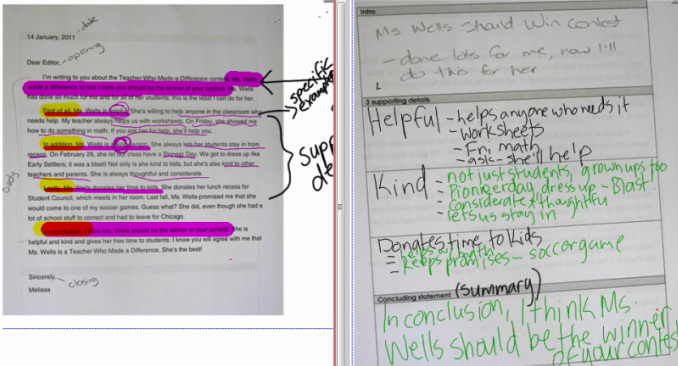Since the topic was school, I figured the students would be pretty engaged. And they were, sort of...
But it was at the END of the lesson, as I made a closing comment, that the students really sat up and took notice.
Once we'd pretty much wrapped up the discussion about the fictional letter to the editor, and discussed why it was a fairly convincing piece of writing, I redirected my students' attention to the "Voices in the Park" book cover we'd posted a few weeks ago, after reading this 4-perspective story they had all enjoyed so much.
"Every story is told from a particular point of view", I reminded them, "and we must always remember to ask whose voice might be missing."
We talked about how although trying to convince someone that your teacher was the best, and most deserving of an award, was a nice "Grade 3 level" topic for thinking about persuasive text and point of view, there were much deeper things brewing on the horizon, and that expository text was not just a topic for today's lesson; as they got older and more experienced in the ways of the world, I told them, they would encounter some very complex and difficult issues about which it would be critical to think deeply. Reflecting on whose point of view is included, in any story, would be very, very important, before drawing one's own conclusion, and articulating one's own "position statement", I noted.
I shared a brief synopsis of the documentary I had watched at hot docs this past weekend, about the murder of an elementary school student by another elementary school student. I spoke slowly, to engage the students' biases and preconceptions:
"So, the movie was about this one student who asked another to be his Valentine..." (I waited for the unconventionality of the situation to register, as evidenced by the looks on some of my students' faces, before continuing.) "... and the other student brought a gun to school and shot him."
I paused to allow the "WHAAAT?! He's BAD! He should go to jail" and similar comments to be uttered before adding the following:
"The student who shot him was only 14 years old himself. Who here has a 14-year-old brother or sister who sometimes makes bad choices and gets into trouble? Can you imagine this sibling in jail for the rest of her life?
"The student who did the shooting grew up in a home where there was a lot of violence. He saw his own mom get shot by his dad, when he was still a little kid. And there were lots of illegal drugs, and...."
My students grew quiet, as they considered the various complicating factors in this difficult true story.
Then the hands shot up, one after another, question after question, about when and how children should be punished, about gun control laws in Canada vs the US, about why some people would get upset by being asked to be the Valentine of another student of the same sex, about why someone might choose to support and protect the shooter (I had told them that the movie included interviews with the defense lawyers as well as the prosecuting attorney)... We could have had an hour-long conversation about any one of the various aspects that arose, and students were keen to explore their own position on a whole bunch of sub-tenets. Even when the bell rang for recess, they sat riveted, wanting to discuss further, until I drew the conversation to a close and chased them all outside to get some fresh air and sunshine.
The experience made me reflect on how and why we choose the topics we do, to use as vehicles for teaching certain skills (in this case, persuasive text). Are we selecting rich enough mentor texts? In a world where our students are daily exposed to the media's often very biased interpretation of violence and social justice issues around the world, does "teacher of the year" really cut it anymore?
Although I yearn to protect the 8-, 9- and 10-year-olds in my class, I can't help by wonder if things might have turned out differently for the primary victim in the story I was telling if their Grade 3 (or 2, or 4) teachers had left "teacher of the year"-type activities at the door, and had instead focused on some of the bigger, more difficult and significant questions in the world of the 21-century learner.
Teaching is a profession of ever-increasing complexity. This afternoon's experience in my own class reminded me that I, too, am subject to falling behind the times!
I vow to continue to think about how I can best offer my students a balance of child-appropriate fun and playfulness on the one hand, and begin to equip them with at least some of the emotional and intellectual tools they will need to navigate and leave their mark on the often unjust world in which they are growing up.



 RSS Feed
RSS Feed